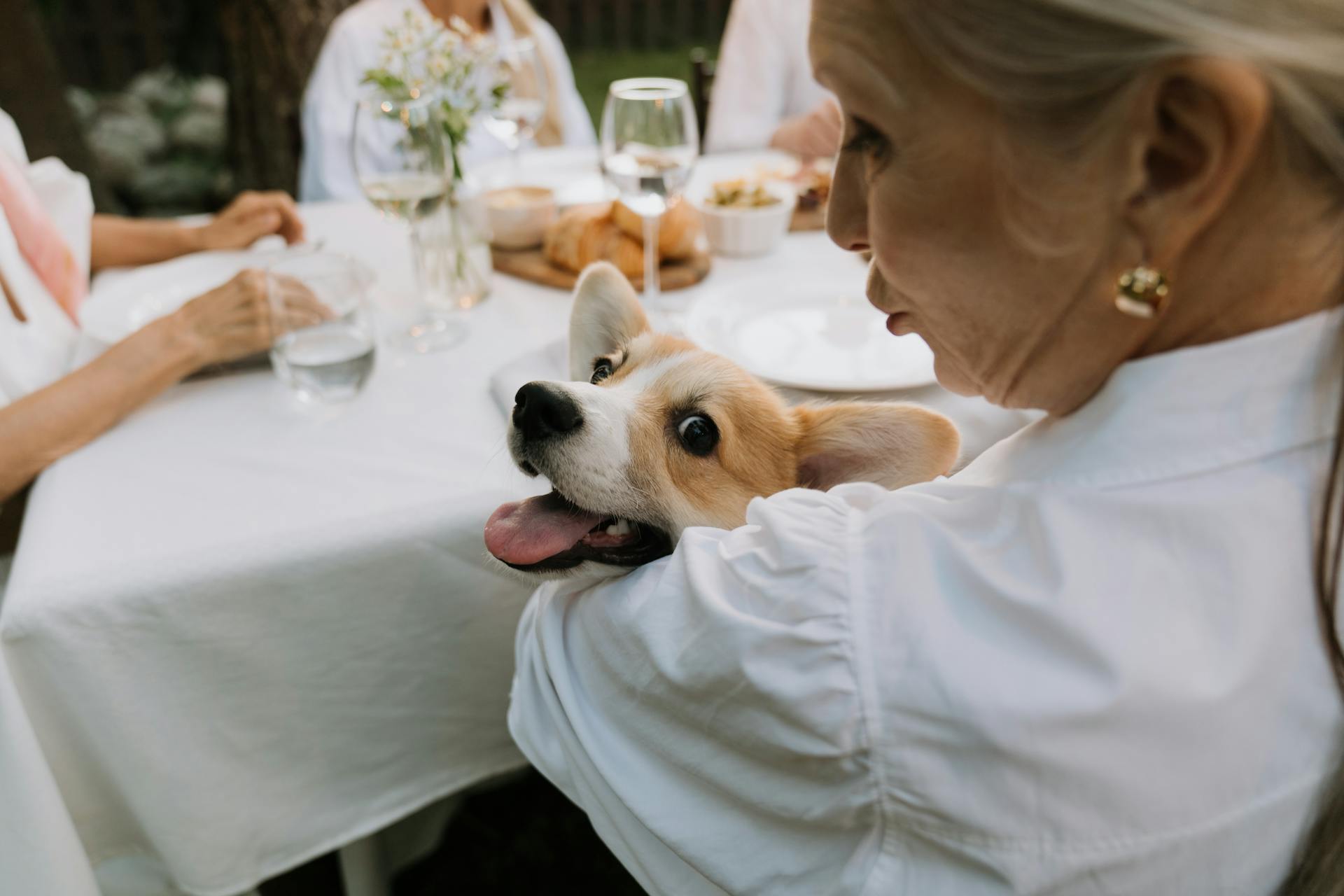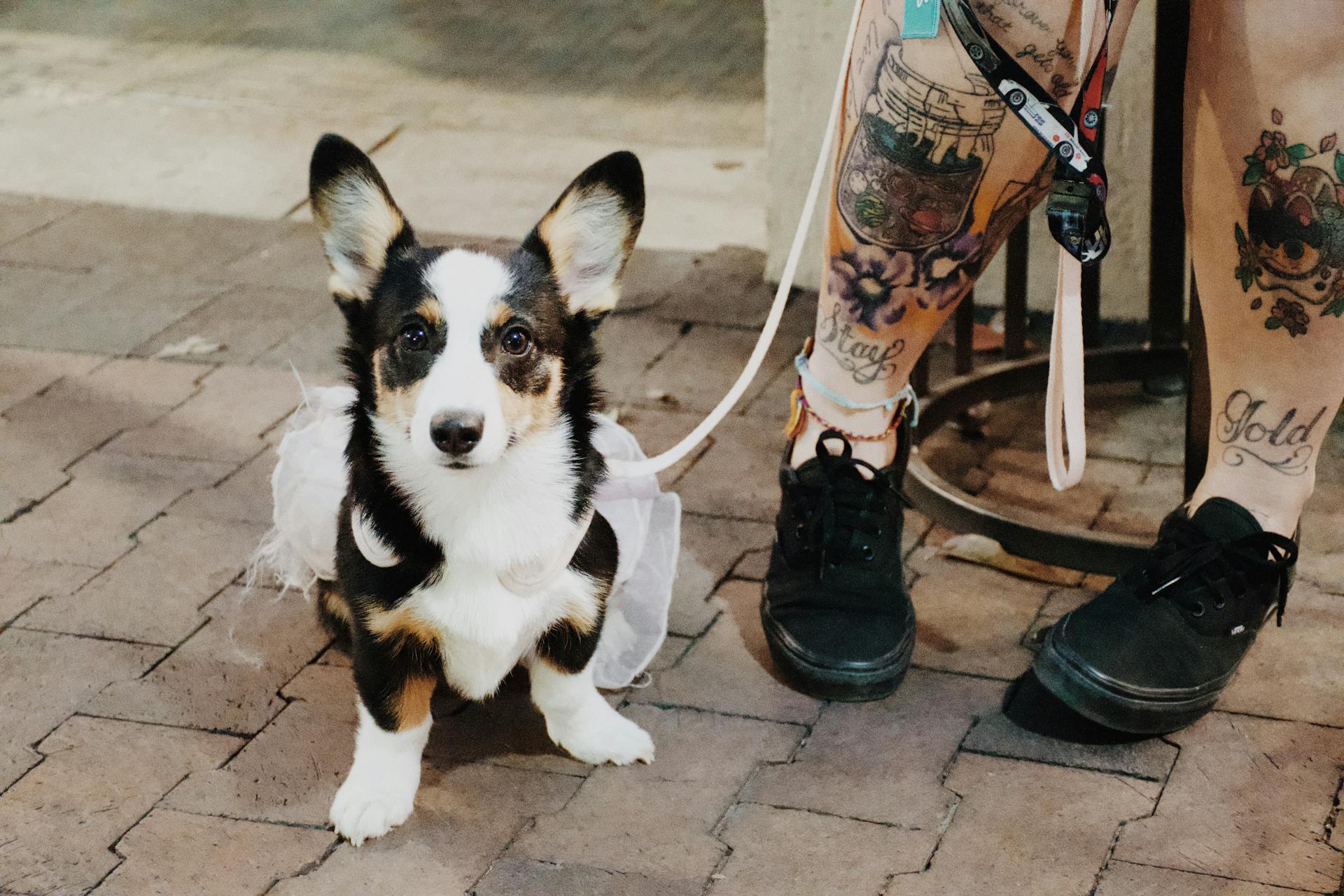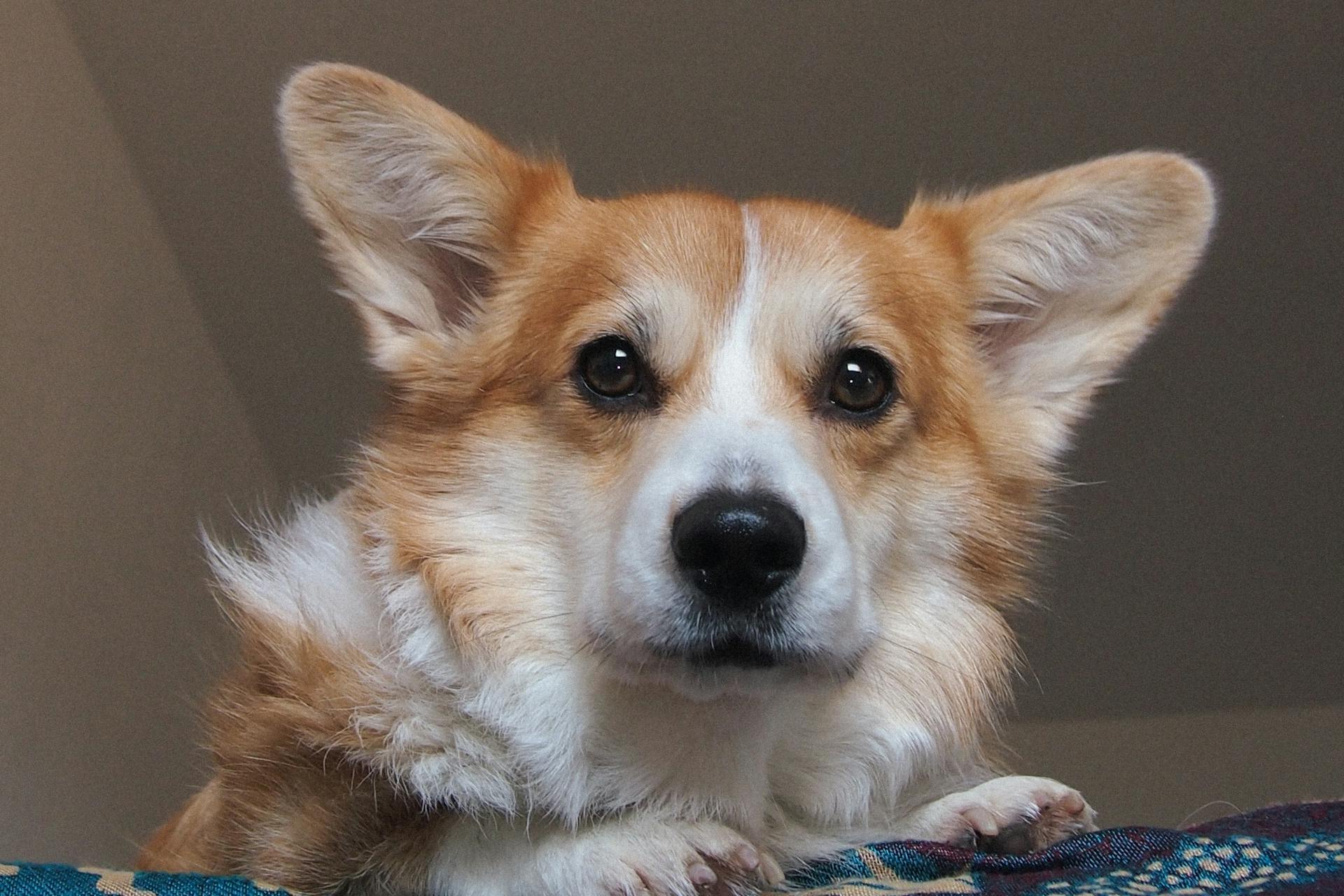
Corgis are a beloved breed known for their short stature and long bodies. They originated in Wales as herding dogs.
There are two main types of corgis: the Pembroke Welsh Corgi and the Cardigan Welsh Corgi. The Pembroke is the more common of the two.
In terms of size, Pembroke Welsh Corgis typically weigh between 25-38 pounds, while Cardigan Welsh Corgis weigh between 30-38 pounds.
On a similar theme: Two Corgis
Breed Information
The Pembroke Welsh Corgi is the most common type of Corgi, accounting for about 75% of all Corgis bred.
They are known for their intelligence and loyalty, traits that make them excel as family pets.
Pembroke Welsh Corgis typically weigh between 25-38 pounds and stand 10-12 inches tall at the shoulder.
Their short stature makes them a great choice for families with smaller living spaces.
The Cardigan Welsh Corgi, on the other hand, is the rarer of the two breeds, with a more muscular build and a distinctive tail.
Cardigans are generally larger than Pembrokes, weighing 30-38 pounds and standing 10.5-12.5 inches tall.
Their intelligence and energy level make them a great choice for active families who enjoy outdoor activities.
Physical Characteristics
Pembroke Welsh Corgis are low-set dogs, much longer than tall, with a firm and level topline.
Their deep chests and strong, flexible hindquarters make them well-suited for herding. Pembroke Welsh Corgis have firm, erect ears that taper to a slightly rounded point.
Their oval, medium-sized eyes convey an intelligent, interested expression. The breed's distinctive ears and eyes give them a unique and alert appearance.
Pembroke Welsh Corgis come in a variety of coat colors, including red, sable, fawn, black, and tan with or without white markings. The breed standard allows for white markings on the legs, chest, neck, muzzle, underparts, and as a narrow blaze on the head.
Their coats are double-layered, with a short, thick undercoat and a longer, coarse outer coat that lies flat. The breed standard also mentions that "Fluffies" have coats that are extreme in length with exaggerated feathering, which is considered a serious fault.
Pembroke Welsh Corgis typically stand between 10 and 15 inches tall and weigh between 20 and 30 pounds. Despite their short stature, they are sturdy and have a robust build that allows for maximum speed and flexibility.
Their tail is often bobbed, but docking is becoming less common for this breed. More and more Pembrokes are sporting a longer tail.
Take a look at this: Cavapoo Coat Types
Care and Maintenance
Pembroke Welsh Corgis need to be brushed weekly with a rubber curry brush to remove dead hair from their fur, ideally in 10-minute sessions.
Their thick double coat sheds constantly, so regular brushing is a must to keep the fur at a manageable level.
You'll want to bathe your Pembroke every 6 to 8 weeks, depending on their activities.
Nail trimming should be done every 2 to 3 weeks to prevent tears and overgrowth.
Weekly teeth brushing is essential for maintaining oral health.
Pembroke Welsh Corgis don't typically have a strong smell and aren't known to be drooling breeds.
Daily exercise is crucial to prevent obesity and keep them happy and content.
They can live in average weather climates, but indoor living with outdoor exercise access is ideal.
A schedule of daily walks and plenty of running area is perfect for this active breed.
Pembroke Welsh Corgis can suffer from various health problems, so it's essential to secure pet health insurance to avoid high veterinary costs.
Check this out: Do Corgis Have Health Problems
Behavior and Training
Pembroke Welsh Corgis are intelligent and love to solve problems, making them quick to pick up dog training. They thrive on positive reinforcement training, which is a breeze due to their love of food.
Their herding instincts can be a challenge if not properly managed, so it's essential to keep their minds engaged and provide them with enough exercise. This will prevent them from transferring their herding instincts to people or other animals in the home.
Pembroke Welsh Corgis are highly trainable due to their intelligence, and they have a strong work ethic. They love to work and remain busy, which is a testament to their original function as herding sheep.
They excel in agility, rally, tracking, and herding, and they fare best when provided with long walks. With proper training, they can get along well with other dogs and pets.
Here are some tips for training your Pembroke Welsh Corgi:
- Use positive reinforcement training methods
- Keep their minds engaged with puzzle toys and interactive games
- Provide them with enough exercise to prevent herding instincts from taking over
- Train them to accept strangers and new situations
- Be patient and consistent in your training approach
History and Development
The Pembroke Welsh Corgi has a rich history dating back to the 1100s in Wales.
They were introduced by Flemish weavers as a working dog, and their exact ancestry is still debated, but it's believed to be a combination of spitz-type breeds such as the Keeshond, Schipperke, and Pomeranian.
The breed's original purpose was to herd sheep and lead them by biting their legs, and they were excellent working dogs that helped Flemish settlers herd cattle and other livestock.
In the 1930s, the Pembroke Welsh Corgi gained popularity when King George VI gifted one to his daughters Elizabeth and Margaret, and it's been a symbol of royalty ever since, with Queen Elizabeth II maintaining a special fondness for the breed.
The Pembroke Welsh Corgi was officially recognized by the AKC in 1934 and has maintained a steady popularity ranking within the organization.
For your interest: Herd of Corgis
History
The Pembroke Welsh Corgi has a rich history dating back to 1107 A.D. in Wales, where they were bred for herding sheep and cattle.
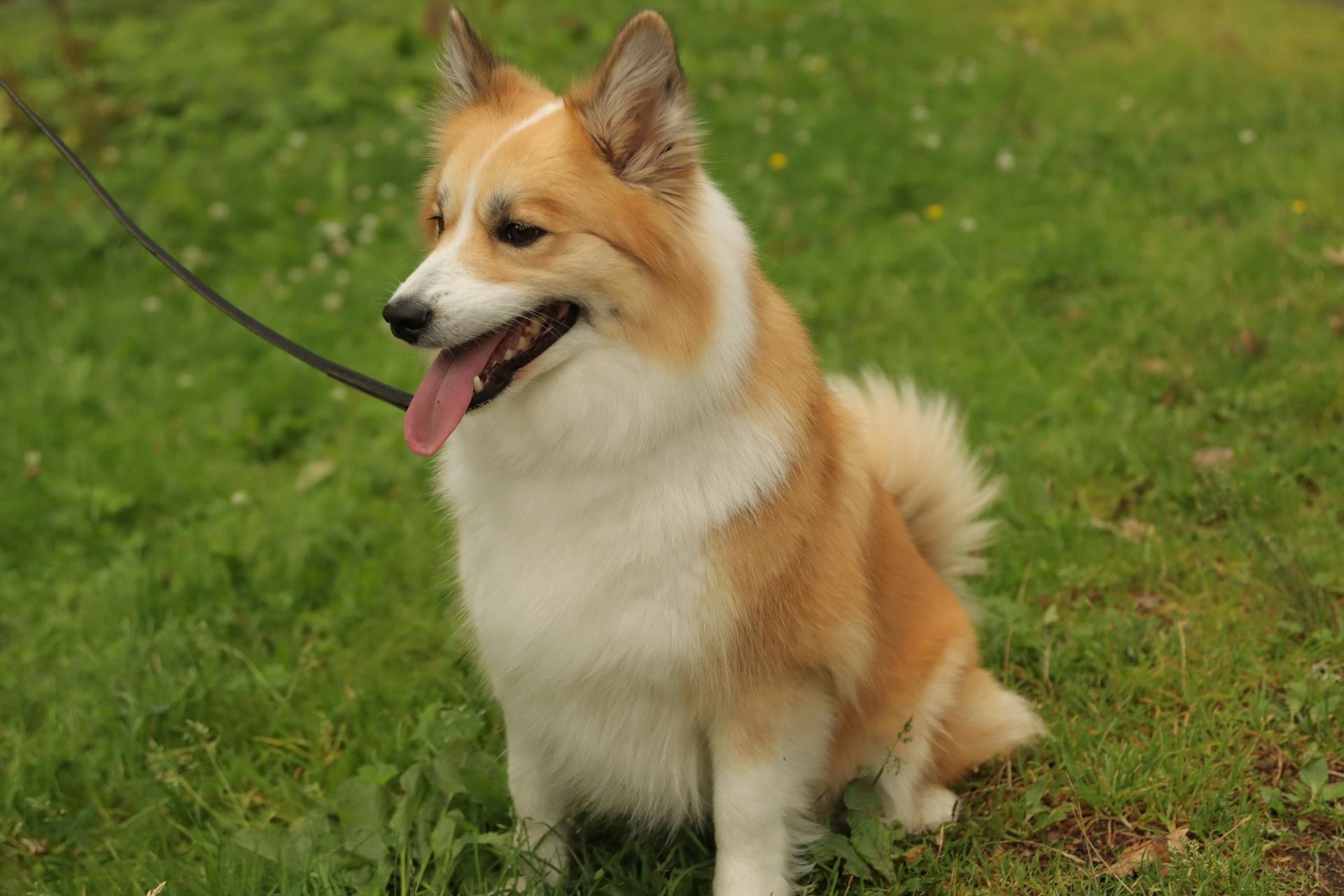
Their origins are shrouded in mystery, but it's believed that Flemish weavers introduced them as working dogs, and they're thought to be descended from spitz-type breeds like the Keeshond, Pomeranian, and Norwegian Elkhound.
In Welsh folklore, Corgis were said to be gifted by fairies to children, and they became an indispensable part of farm life, helping with herding and other tasks.
The breed's original purpose was to herd sheep by biting their legs, a task they still excel at today.
The Pembroke Welsh Corgi was officially recognized by the AKC in 1934, and their popularity soared when Queen Elizabeth II gifted one to her daughters Elizabeth and Margaret in the 1930s.
Their short legs and sturdy build made them perfect for farm work, and they were bred for their intelligence, working abilities, and good temperament.
The breed has maintained a steady popularity ranking within the AKC, although it's not as high as it used to be.
Queen Elizabeth II has been a devoted Pembroke owner, getting her first one in 1933 and owning over thirty Corgis during her reign.
The Pembroke Welsh Corgi has also made a name for itself in media, appearing in an anime called Cowboy Bebop as a dog named Ein who was enhanced by humans.
Their popularity in the United States was boosted by media coverage of the Queen's Corgis, and they're now a favorite on social media, with many puppies having their own Instagram accounts and huge followings.
For another approach, see: Queen Elizabeth and Her Corgis
Changes Over Time
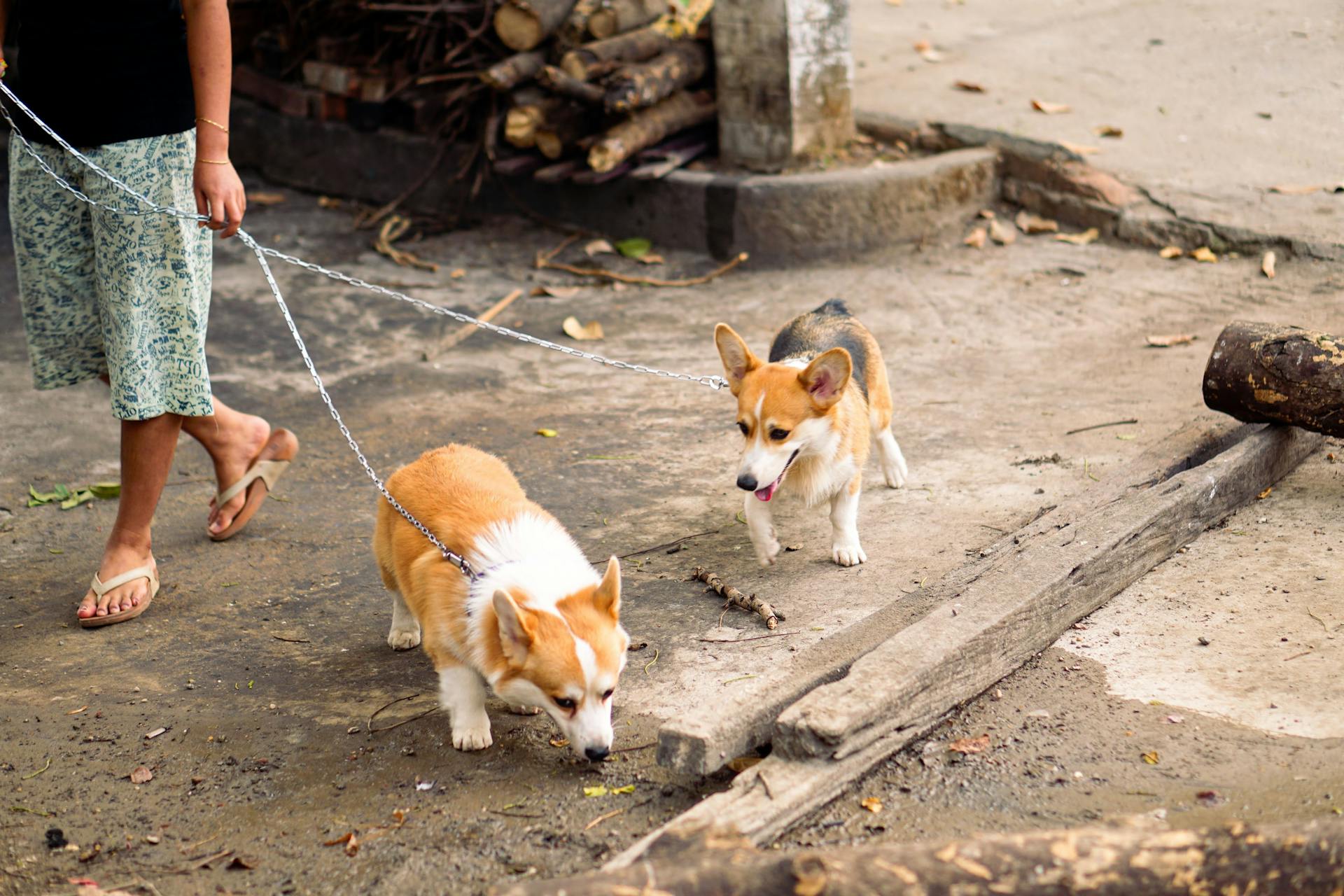
The Pembroke Welsh Corgi breed has undergone significant changes over time. In 1934, the Pembroke Welsh Corgi and the Cardigan Welsh Corgi were recognized as two separate breeds.
Queen Elizabeth II was a huge influencer for the breed, thanks to her first Pembroke Welsh Corgi, Dookie, which she received as a gift from her father in 1933. Dookie was a beloved companion that helped popularize the breed.
The popularity of the Pembroke Welsh Corgi has fluctuated over the years. In 2014, only 274 Pembroke puppies were registered with the Kennel Club in the United Kingdom, a significant decline from previous years.
However, the breed's popularity has experienced a resurgence in recent years. In 2015, the breed's popularity spiked again in the United Kingdom, and it has consistently ranked in the top 20 most popular dog breeds in the United States into the 2020s.
Explore further: What Are Corgis Mixed with
Breed Group
The Pembroke Welsh Corgi's breed group is Herding. This group includes dogs that were originally bred to herd livestock.
Herding dogs are highly intelligent and active, which is evident in the Pembroke Welsh Corgi's ability to excel in this role.
See what others are reading: Corgi Dog Group
Frequently Asked Questions
What's the difference between a welsh corgi and a pembroke corgi?
While both Welsh and Pembroke Corgis are breeds of Corgis, the main difference lies in their tail length, with Pembroke Corgis having a short bobbed tail and Welsh Corgis (also known as Cardigan Corgis) having a long fluffy tail. This physical difference is just one of the many unique characteristics that set these two breeds apart.
Which type of Corgi is better?
For laid-back families, the Cardigan Corgi is a great fit, while the Pembroke Corgi suits adventurous families better. Choose the Corgi breed that matches your family's lifestyle for a perfect match.
Which Corgi is calmer?
Cardigans are generally the calmer of the two Corgi types, requiring less exercise and being adaptable to varying activity levels.
What are the different kinds of Corgis?
There are two distinct breeds of corgis: Pembroke Welsh corgis and Cardigan Welsh corgis. Learn more about their unique characteristics and differences.
What is the difference between a Welsh and American Corgi?
The main difference between Welsh and American Corgis is their size, with American Corgis being slightly larger. Despite their size difference, they share similar personalities, energy levels, and grooming needs.
Sources
- https://www.womansday.com/life/pet-care/g62270593/corgi-mix-dog-breeds/
- https://wagwalking.com/breed/pembroke-welsh-corgi
- https://www.wisdompanel.com/en-us/dog-breeds/pembroke-welsh-corgi
- https://www.trupanion.com/pet-blog/article/pembroke-welsh-corgi
- https://figopetinsurance.com/blog/pembroke-welsh-corgi-breed-guide
Featured Images: pexels.com

